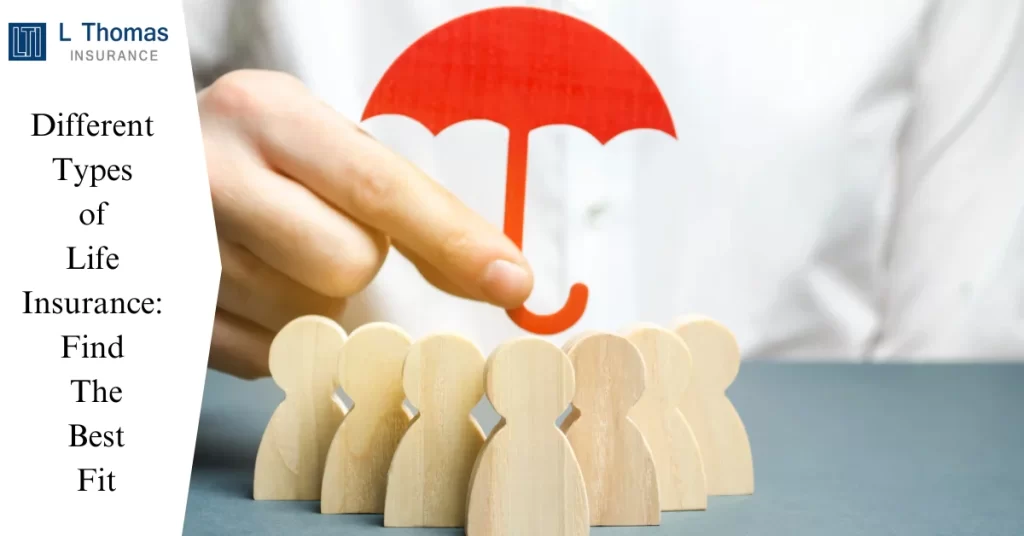The insurance company assumes the financial risk of covering these events in exchange for the premiums paid by the policyholder. There are many different types of insurance,
Get In Touch
Call Now
(239) 940-9386
Quick Email
info@lthomasinsurance.com
Office Address
4040 Princeton Street Fort Myers, Florida 33901

Different Types of Life Insurance: Find The Best Fit
Choosing the right life insurance policy can be overwhelming, but it’s a crucial step in securing financial peace of mind for you and your family. With various policies available, understanding the different types of life insurance can help you determine what type of life insurance is best for your specific needs. This article provides an in-depth look at the different types of life insurance to help you make an informed choice.
Term Life Insurance
Term life insurance is one of the most straightforward and commonly chosen types. It provides coverage for a set period, such as 10, 20, or 30 years. If the policyholder passes away during the term, their beneficiaries receive the death benefit. However, once the term expires, coverage ceases unless renewed, usually at a higher premium.
Advantages of Term Life Insurance:
- Affordability: Term life insurance is typically the most affordable option among the different types of life insurance.
- Simplicity: This policy is easy to understand and manage.
- Flexibility: Available in various terms to match financial obligations, such as mortgage periods or a child’s education.
Disadvantages:
- No cash value component; the policy only pays out if the insured dies during the term.
- Renewal after the term can be costly as premiums increase with age.
Best For: Individuals seeking coverage for a specific period at a lower cost. If you’re wondering what type of life insurance is best for a young family with financial obligations, term life insurance is often recommended.
Long Term Care Life Insurance
Long-Term Care Insurance (LTC) helps cover the cost of extended care needs, such as in-home assistance, nursing homes, or assisted living facilities, which Medicare and standard health insurance typically don’t cover. It’s designed to protect personal savings and provide flexibility in care options, though premiums can be costly, especially if purchased later in life.
Benefits of LTC
- Protects Savings: LTC insurance helps cover high costs of long-term care, protecting your savings and assets from being drained by care expenses.
- Flexible Care Options: Many policies cover various types of care, including in-home care, nursing homes, and assisted living facilities, giving you flexibility in where and how you receive care.
- Peace of Mind: Knowing you have coverage can reduce stress for you and your family if you need long-term care later in life.
- Inflation Protection: Some LTC policies offer options to keep up with inflation, which is especially useful as healthcare costs continue to rise.
Downside of LTC
- High Cost: Premiums can be expensive, especially for policies purchased later in life, and may increase over time.
- Use It or Lose It: If you don’t end up needing long-term care, the money you paid into the policy is generally not refunded.
- Health Requirements: Approval for LTC insurance may depend on your health, and pre-existing conditions can lead to higher premiums or denial of coverage.
- Complex Terms: Policies can be complex, with limits on benefits, waiting periods, and specific care restrictions, which can make it challenging to understand what’s covered.
Best For
- Middle to High-Income Individuals: Those who want to protect assets and avoid depleting their savings to pay for long-term care.
- Aging Individuals without Family Caregivers: If you don’t have family members available to help with long-term care, this insurance can offer essential support.
- People Planning for Retirement: Individuals in their 50s or 60s who want to plan for potential long-term care needs in advance, before premiums become too high.
Important: The terms “term care insurance” and “long-term care insurance” can be confusing, as they sound similar. So the term care insurance covers short-term, temporary care needs, while long-term care insurance is geared toward providing ongoing care for chronic conditions or age-related needs over the long term.
Note: If you are looking for best Long Term Insurance in Florida, USA than visit L Thomas Insurance.
Whole Life Insurance
Whole life insurance is a type of permanent insurance that provides coverage for the policyholder’s entire lifetime as long as premiums are paid. It also includes a cash value component that grows over time at a guaranteed rate, offering financial flexibility.
Benefits of Whole Life Insurance:
- Lifelong Coverage: Unlike term life insurance, whole life insurance ensures lifelong protection.
- Fixed Premiums: Premiums remain constant throughout the policyholder’s life.
- Cash Value Accumulation: The policy builds cash value, which can be borrowed against or withdrawn, adding a savings component to your coverage.
Drawbacks:
- Higher Premiums: Whole life insurance is more expensive than term life insurance due to its permanent coverage and cash value feature.
- Limited Flexibility: Investment options for cash value are generally conservative, limiting potential growth.
- Best For: Those looking for a policy that combines life insurance with a savings element. If you’re considering what type of life insurance is best for building long-term financial security, whole life insurance might be an excellent choice.
Universal Life Insurance
Universal life insurance is another type of permanent life insurance with more flexibility than whole life insurance. It provides both a death benefit and a cash value component that can grow based on current market interest rates.
Key Advantages of Universal Life Insurance:
- Adjustable Premiums: Policyholders can increase or decrease premium payments within certain limits.
- Flexible Death Benefit: The amount of the death benefit can be modified over time.
- Tax-Deferred Growth: The cash value component grows tax-deferred, providing additional financial benefits.
Potential Downsides:
- Complexity: Managing and understanding the policy requires a more hands-on approach compared to other types.
- Variable Cash Value Growth: The cash value is tied to interest rates and market conditions, which can fluctuate.
- Best For: Individuals who need flexibility in premium payments and death benefits. If you want a customizable policy, universal life insurance is one of the best types to consider.
Tip: If you want to know what universal life insurance plans in Florida are available you can visit your near insurance provider.
Variable Life Insurance
Variable life insurance offers permanent coverage with a cash value component invested in sub-accounts similar to mutual funds. This type allows policyholders to take advantage of potential market growth but also comes with investment risks.
Benefits of Variable Life Insurance:
- Potential for High Returns: Cash value growth can be significant if investments perform well.
- Customizable Investments: Policyholders can choose from a range of investment options.
- Permanent Coverage: As with whole and universal life insurance, coverage lasts a lifetime.
Drawbacks:
- Investment Risk: Poor market performance can reduce cash value and the death benefit.
- High Fees: Management fees and charges can reduce the policy’s overall value.
- Best For: Those who are financially savvy and comfortable with investment risks. If you’re looking for an insurance policy with potential growth and can handle market fluctuations, variable life insurance might be the best type of life insurance for you.
Quote: A hybrid insurance option called variable universal life insurance which combines features of both variable life and universal life insurance. This type of policy lets you adjust your premiums, giving you flexibility if you don’t want to commit to a fixed payment each month. Like variable life insurance, it also allows you to invest your policy’s cash value in various funds, which can grow over time based on market performance. This makes it a good option for people looking for both investment opportunities and flexible payments.
Final Expense Insurance (Burial insurance)
Final expense insurance, or burial insurance, is a type of whole life insurance with a smaller death benefit, typically used to cover end-of-life costs such as funeral expenses, medical bills, and burial services.
Advantages of Final Expense Insurance:
- Simple Approval Process: Easier to qualify for compared to other policies.
- Affordability: Lower premiums due to the smaller coverage amounts.
- Dedicated Purpose: Provides peace of mind that funeral and related expenses are covered.
Disadvantages:
- Limited Death Benefit: The smaller payout may not be sufficient for larger financial needs.
- Higher Cost per Dollar: May be more expensive relative to the benefit provided when compared to larger life insurance policies.
- Best For: Older individuals or those with limited income looking for basic coverage to ease the financial burden on their loved ones.
Other Life Insurances
- Group Life Insurance: Often provided by employers as a workplace benefit. The premium cost is based on the entire group, not individual health. Many employers offer basic coverage for free, with an option to buy extra coverage if needed.
- Mortgage Life Insurance: This policy covers the balance of your mortgage and pays the lender directly if you pass away, so it helps make sure your home loan is paid off but doesn’t provide a direct payout to your family.
- Credit Life Insurance: Similar to mortgage insurance, this type covers a specific loan (like a home equity loan) and pays the lender if you die, making sure your debt is cleared.
- Accidental Death and Dismemberment (AD&D) Insurance: This insurance provides a payout if you die or are seriously injured in an accident, such as losing a limb, vision, or hearing. It’s usually offered through work.
- Joint Life Insurance: Covers two people, usually spouses, in one policy:
- First-to-Die: Pays out when the first person passes away, but coverage ends after that.
- Second-to-Die: Pays out only after both policyholders have passed away, which can help cover estate taxes or provide support for a dependent.
These policies help cover different needs, from protecting loans to providing financial support in specific situations.
How to Decide What Type of Life Insurance Is Best for You
When evaluating different types of life insurance, consider your budget, long-term financial goals, and the needs of your dependents. For someone young and healthy with children, term life insurance might be the best type of life insurance due to its affordability. For those who want lifelong protection and a way to build savings, whole life insurance or universal life insurance could be a better fit.
Final Thoughts
Understanding the different types of life insurance can empower you to make a decision that protects your loved ones and aligns with your financial plans. Whether you’re leaning towards the straightforward approach of term life insurance, the comprehensive coverage of whole life insurance, or the flexible structure of universal life insurance, the best life insurance in Florida, USA that fits your specific needs and budget.
About Us
Other Pages
Official Info
© Copyright 2024-25 – L Thomas Insurance | Developed & Marketing by Animaker Media






